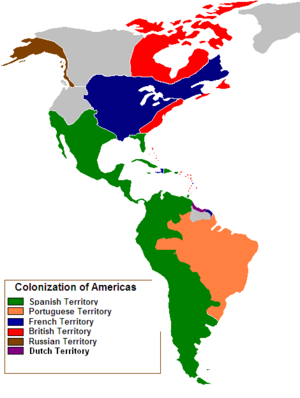Read the Other Posts in this Series: Back To Basics I: American Exceptionalism; Back to Basics II: Science, Back To Basics III: The Economy, Back to Basics IV: Culture; Back to Basics V: Recap; and the drivel that inspired me to action: The Story of Stuff

 Two things have really driven this widespread lack of understanding home to me lately. First, during the presidential campaign I clearly remember American Exceptionalism being bandied about a lot. The fact that this was debatable outside of some far extreme fringe subculture of this society was incomprehensible to me. Second, the more recent stark lesson in just how fundamentally screwed up some of our children’s school lessons have become; specifically The Story of Stuff. So I am going to do a series of posts to correct this notion that America is a bad place and has hurt this world. First I want to make one point very clear:
Two things have really driven this widespread lack of understanding home to me lately. First, during the presidential campaign I clearly remember American Exceptionalism being bandied about a lot. The fact that this was debatable outside of some far extreme fringe subculture of this society was incomprehensible to me. Second, the more recent stark lesson in just how fundamentally screwed up some of our children’s school lessons have become; specifically The Story of Stuff. So I am going to do a series of posts to correct this notion that America is a bad place and has hurt this world. First I want to make one point very clear:
Patriotism
a devoted love, support, and defense of one’s country; national
loyalty.
I am not arguing patriotism here. Every citizen of every country should love their country and see it as a place with a unique position in history. I am not talking about mere nationalism. I am talking about this country being unique in the annals of all recorded history. This country is different from all others before it and is uniquely different than every other country of the past and present.
ex·cep·tion·al·ism (k-spsh-n-lzm) n.
1. The condition of being exceptional or unique.
2. The theory or belief that something, especially a nation, does not
conform to a pattern or norm.
What is a nation?
Nation 3. A people who share common customs, origins, history, and frequently
language; a nationality.
What customs and values makes a nation unique? In what ways does a nation distinguish itself? Military Might? Scientific Advancement? A Powerful economy? Cultural Prevalence?


At the end of WWII, only two military powers of any consequence
remained: the United States, and the Soviet Union, and while the Soviets had a large army, They virtually had no navy, and their air force was nonexistent. Not to mention they were starving. Whereas, the United States possessed, intact, the most awesome kick ass Navy the world had ever seen (hell yeah), much larger and more advanced than that of the Mighty British navy that had helped the Brits establish an empire not rivaled since before the time of Christ. We possessed the largest and most advanced air force of any nation. We, alone, had the atomic bomb and the will to use it. (for better or for worse, we had the power to destroy the planet. )

What did we do with this awesome power? Did we do as Conan would have had us to do? “to drive our defeated enemies before us and to hear the lamentations of their women and children” as we settled their lands? No. We did what NO other country in history who has destroyed its enemies has EVER done. We departed the field of battle, returned home, scrapped our military, literally turning our war ma chine into construction materials, and then returned to the defeated lands and rebuilt the nations that we had just laid waste to. As Colin Powell has been quoted as saying, the only thing we asked for was the space to bury our dead. AND …WE, WE PAID for the rebuilding effort! And in all the time since then despite what many of the Hollywood crowd have implied, nor what many of the hippies and radicals have proclaimed as fact, we have never been imperial.
chine into construction materials, and then returned to the defeated lands and rebuilt the nations that we had just laid waste to. As Colin Powell has been quoted as saying, the only thing we asked for was the space to bury our dead. AND …WE, WE PAID for the rebuilding effort! And in all the time since then despite what many of the Hollywood crowd have implied, nor what many of the hippies and radicals have proclaimed as fact, we have never been imperial.
empire 1. a. A political unit having an extensive territory or comprising a number of territories or nations and ruled by a single supreme authority.3. Imperial or imperialistic sovereignty, domination, or control:
This is why Spain France and Britain colonized North America. First the lure of GOLD and then the lure of trees, furs, food, etc. This is a key charge of The Story of Stuff: that we have gotten rich by taking wealth and resources of the third world countries. So, is the US an Empire? Well, where are our colonies? Psst, there aren’t any. We have a handful of very small territories that stay that way of their choosing, and also repeatedly vote not to become states. We do have military  bases all around the globe, but far from as we see in movies from back in the knight in shining armor days, our armies do not pillage an area, nor do we make other nations pay tribute to us, no declaring our right to prima nocte, but rather we pump vast amounts of money into those other economies. Other nations appreciate the income that military bases produce, and the protection they provide. A little known fact is that if the EU had to provide for its defense they would not be able to afford Socialism. Free trade (Capitalism) is the economic and moral antithesis of imperialism.
bases all around the globe, but far from as we see in movies from back in the knight in shining armor days, our armies do not pillage an area, nor do we make other nations pay tribute to us, no declaring our right to prima nocte, but rather we pump vast amounts of money into those other economies. Other nations appreciate the income that military bases produce, and the protection they provide. A little known fact is that if the EU had to provide for its defense they would not be able to afford Socialism. Free trade (Capitalism) is the economic and moral antithesis of imperialism.
But you may say what our “wars for oil.” We have destroyed Iraq twice in the last 20 years and we did it both times in a matter of days. So stop and think, here is what a “war for oil” would look like: First the SEALS would HALO jump right down on the pumping stations and tank farms and in about an hour would secure the oil fields. Then we’d place an armored perimeter around the oil fields using M1A1’s, Bradley’s, and artillery. Lastly, using convoys protected by high flying air superiority fighters, and low flying Apache helicopters we would transport OUR oil to a secure port where it would be pumped onto US tankers and escort ed out of the region by a Carrier Battle Group. Who would begin to oppose us? We had them, and what did we do in ‘91 when Saddam had set them on fire and they were ours for the taking…?
ed out of the region by a Carrier Battle Group. Who would begin to oppose us? We had them, and what did we do in ‘91 when Saddam had set them on fire and they were ours for the taking…?
In all our Imperial Glory We put out the fires and then we came home.
Not much of an empire…I would call that decidedly Anti-Imperial. No country ever in history has done that. That is unique. That’s exceptional.
Part two tomorrow…
Read the Other Posts in this Series: Back To Basics I: American Exceptionalism; Back to Basics II: Science, Back To Basics III: The Economy, Back to Basics IV: Culture; Back to Basics V: Recap; and the drivel that inspired me to action: The Story of Stuff
-KOOK
